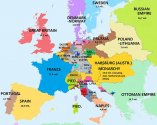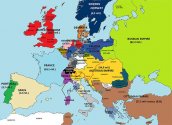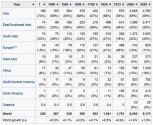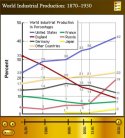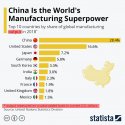This is typical confusion of history with historical propaganda. History is a record of evolutionary processes meaning we know what was happening only after we get the result of evolutionary contest. Historical propaganda on the other hand suffers from survivor's bias and reads history backwards from the result implying that is was somehow inevitable and attributing it to choices made by specific individuals or groups as means of legitimizing the result.
Because our current culture is dominated by the anglosphere we tend to treat American and British historical propaganda as history. It is not history but a lie.
Here's real history.
This is population map of Europe in 1789
View attachment 73574
Note the four powers - France, Austria, Russia and Turkey. Those four countries are the
established powers. Britain and Prussia are the
rising powers. France and Russia were rising powers in the period between 1610 and 1740 when Ottomans, Poles and Hapsburgs were the established powers. Specifically the Great Northern War and both wars of Hapsburg succession (Spanish and Austrian) were the conflicts that resulted in the shift of the balance of powers.
This is population map of Europe in 1840
View attachment 73575
These maps explain the rise of Britain and Germany. Britain is also aided by their relative security and by centralization of political power which occurred even before the French Revolution. This spares Britain the messy and costly period of political centralization and resulting wars allowing them to build up their industrial, economic and military (naval) potential. Britain also benefits from geography in a peculiar way - because the same thing that provides global influence (navy) also provides security they do not have to split investment like other land powers. They double the investment in the navy and that is a positive feedback cycle.
In general the rise of European powers on a global scale can be explained by correlating the rise of European power with the growth of population resulting from industrial revolution.
This is world's population over time.
View attachment 73577
You can clearly see that the
rise of European power corresponds to rise of European power base. That base is rooted in industrial economy and the resulting technology specifically steel and coal power.
The period of unchallenged European (and American) dominance lasts between 1840 and 1940 and can be correctly described as "European moment".
After 1940 the world experience an "American moment".
But before I elaborate on that I have to note that it is a grievous, fundamental error to treat Great Britain and United States as a single entity. They are rivals competing for the same sphere of influence that confuses external observers because of cultural similarities. The relationship between America and Britain is that of Prussia and Austria. If anything you should treat the United States as engaging in a hybrid war with Great Britain over its empire since its inception. The war ended in American victory and the vassalization of the former colonial sovereign which resulted in Brexit. It's an absurd notion that just because a country speaks the same language and shares history it must share the same political interest. The case of Ireland and Iceland (Cod Wars) is a great example of how that illusion - mostly maintained by Britain clinging to delusions of grandeur, but also often brought up by America (when it serves their interest) - is works out in reality.
Returning to "American moment" - what happens following WW2 is a variation of the same process except that the power base shifts to America as power source of the first industrial revolution (coal) is replaced by the power source of second industrial revolution (oil). Europe has plentiful coal, but almost no oil. Oil is in the Soviet Union which allows it to claim superpower status despite suffering devastation in both world wars. Europe has to fight for oil in the Middle East where it is outcompeted by the rising powers (USA and USSR) within a decade. The Suez Crisis is the historical event that is typically given for the sunset of European imperial power. Without oil they simply have no resources to fight for imperial influence worldwide and that leads to "decolonization".
The rise of American power is explained by objective factors.
In 1940 the US has 40% of global manufacturing and 60% of global oil production.
View attachment 73578
This along with geographical separation allows it to outcompete other powers without suffering damage to its power base and establish itself as a global power with the help of the new dollar-based financial system and nuclear weapons - both of which ironically are provided by the British who naively see Americans as a tool to be used as means of retaining their global power. American imperial elites agree because the population is heavily isolationist and it is easier to convince them to accept American empire when it is done by stealth. British imperial elites have no other choice.
Initially the Sterling and the US Dollar share 50% of global reserves but after the collapse of Bretton Woods the share of Sterling reserves drop below 5%. Dollar retains plurality of reserves but the rising currencies of industrial-manufacturing powers of Germany and Japan and the ECU (the internal currency of the EEC) match it in total by 1990. In the meantime the US moves to secure an "oil standard" in place of a gold standard by forcing oil producers in the Middle East to use US dollars exclusively for energy trade. This process lasts from 1973 when the "petrodollar" is established to now and both of the Iraq wars are instrumental in making sure that no Middle Eastern country dares to trade in any other currency. The political isolation of Iran and Venezuela are direct consequence of those countries seeking to establish alternative markets. Because of American military power the only country capable of it is Russia which unfortunately does not have an established market economy.
Currently American global power is dependent on the continuation of dollar hegemony. Without it American empire will collapse in exactly the same fashion as the British empire because it no longer has the advantage it held in 1945. It is no longer the world's sole nuclear power, undamaged major economy, major manufacturer, major oil producer, major food producer, major provider of capital. It is the world's sole bully with a printing press.
Because of currency wars it is difficult to estimate share of production but this is an attempt:
View attachment 73579
The US will decline for the very same reasons why it ascended - just like it happened to their British predecessors.
Once you ignore American and British propaganda narratives distorting history you realize that China is not
rising. China is just returning to its natural place in the world. It were the British and American who
rose when the world was otherwise occupied.
A rising power can fall when it grows its sphere of influence beyond its capacity to sustain it. When that happened even the "native" colonies of Australia and Canada slipped away from under Westminster's control. But a power residing in its natural sphere of influence can't be easily subdued - just look to France and Russia who both had their "eras of humiliation".


